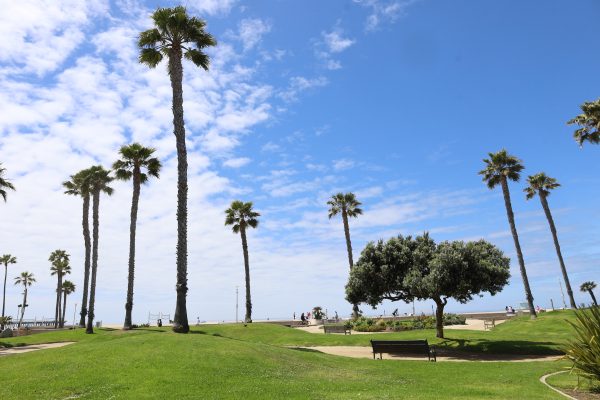
Jeff Duclos called for consideration of one or more pedestrian bridges over Pacific Coast Highway to provide new city gateway landmarks, make it safer to cross the highway, and to link the east and west sides of “the divided city,” as he assumed the Hermosa Beach City Council’s rotating mayoralty.
He said money could be sought from the federal and state governments for such a project.
“I pledge to all the children and adults in our community, who have expressed their concerns about crossing this busy highway, that in the months ahead I will explore this concept of bridging the highway and will do my best to identify those in the community who might want to join me in this exploration,” Duclos told his council colleagues at the mayoral handoff on Tuesday.
“I recognize this will be a challenging project that may take years to complete. But I am happy to take the lead to get the discussion started, without any initial investment of staff time or city funds,” he said.
Duclos said the city of Dana Point bridged the highway with $3.1 million of non-city money, and four bridges span the highway in Santa Monica.
“We are grateful for the leadership and the service our former mayor, Howard Fishman, provided as the council adopted several new initiatives that will improve the health of our community and provide further protection to our environment,” Duclos said. “As we look forward, my goal is to build on his record of achievement and ensure a better future for the young people of our great city.”
He said the city must hire a permanent replacement for City Manager Steve Burrell and Police Chief Greg Savelli, who have retired, and shepherd the environmental review of a proposed project to slant-drill for undersea oil from a city maintenance yard seven blocks inland.
The project will go forward only if Hermosa voters decide to lift, at least partially, a citywide drilling ban that they imposed in 1995. The City Council unanimously agreed to hold the public vote next year, as part of a settlement that ended a $750 million breach-of-contract lawsuit by an oil company.
“And even while, with the settlement of the Macpherson lawsuit, we have eliminated forever the foreboding threat of a possible catastrophic judgment against the city, in the process we have raised other uncertainties,” he said.
“But there is a difference between the uncertainties of the lawsuit and the uncertainties we face today. And we need to be ever mindful of that difference. The difference is: the future of our community is now in the hands of the people of our community. It no longer rests in the authority of others.”
If voters reject the drilling project, the city will pay $17.5 million over 20 years. The environmental review will be conducted before the public vote.
Duclos, a 33-year Hermosa resident, called for a civil discussion of the potential oil drilling project.
“We can make a conscious decision to not be carried away by the wave of anger in which this entire country is so immersed. But to do so in today’s Hermosa Beach will not be easy,” he said.
Since 1932, the city has held four prior elections on oil drilling projects, voting once to allow it and three times to ban it or continue a ban.
“We must realize that, as difficult as it may be, we can make the choice not to engage in this debate regarding oil drilling as we have in the past,” Duclos said. “We can span our differences and pledge allegiance to the old public virtues of respectful disagreement.”
Duclos is a public relations professional and college teacher who has served on the City Council since 2009. His wife Christine is a longtime Hermosa schoolteacher who teaches science and journalism at Hermosa Valley School. The couple has two grown children.










